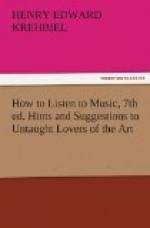“Sinfonia caracteristica,
or a recollection of country
life.”
“All painting
in instrumental music, if pushed too far, is a
failure.”
“Sinfonia pastorella.
Anyone who has an idea of country life
can make out for himself
the intentions of the author
without many titles.”
“People will not
require titles to recognize the general
intention to be more
a matter of feeling than of painting in
sounds.”
“Pastoral symphony: No picture, but something in which the emotions are expressed which are aroused in men by the pleasure of the country (or), in which some feelings of country life are set forth."[C]
As to the relation of programme to music Schumann laid down an admirable maxim when he said that while good music was not harmed by a descriptive title it was a bad indication if a composition needed one.
[Sidenote: Classic and Romantic.]
There are, among all the terms used in music, no words of vaguer meaning than Classic and Romantic. The idea which they convey most widely in conjunction is that of antithesis. When the Romantic School of composers is discussed it is almost universally presented as something opposed in character to the Classical School. There is little harm in this if we but bear in mind that all the terms which have come into use to describe different phases of musical development are entirely artificial and arbitrary—that they do not stand for anything absolute, but only serve as platforms of observation. If the terms had a fixed meaning we ought to be able, since they have established themselves in the language of history and criticism, to describe unambiguously and define clearly the boundary which separates them. This, however, is impossible. Each generation, nay, each decade, fixes the meaning of the words for itself and decides what works shall go into each category. It ought to be possible to discover a principle, a touchstone, which shall emancipate us from the mischievous and misleading notions that have so long prompted men to make the partitions between the schools out of dates and names.
[Sidenote: Trench’s definition of “classical."]
The terms were borrowed from literary criticism; but even there, in the words of Archbishop Trench, “they either say nothing at all or say something erroneous.” Classical has more to defend it than Romantic, because it has greater antiquity and, in one sense, has been used with less arbitrariness.
“The term,” says Trench, “is drawn from the political economy of Rome. Such a man was rated as to his income in the third class, such another in the fourth, and so on, and he who was in the highest was emphatically said to be of the class, classicus, a class man, without adding the number as in that case superfluous; while all others were infra classem.




